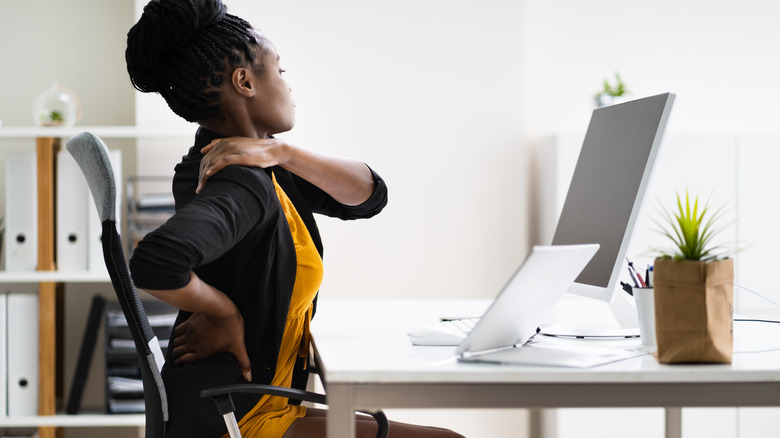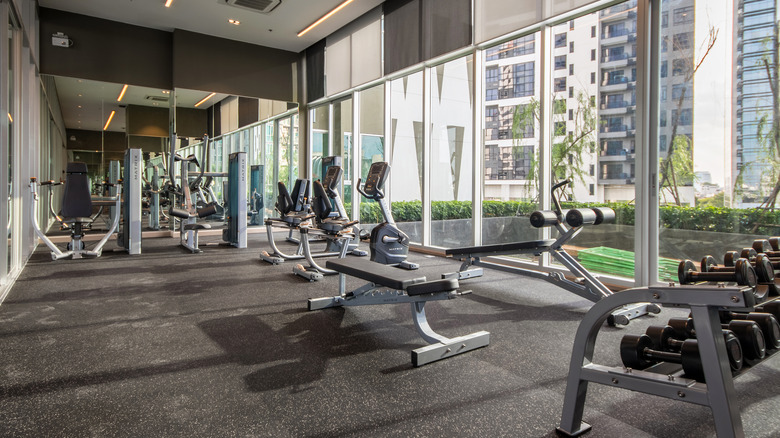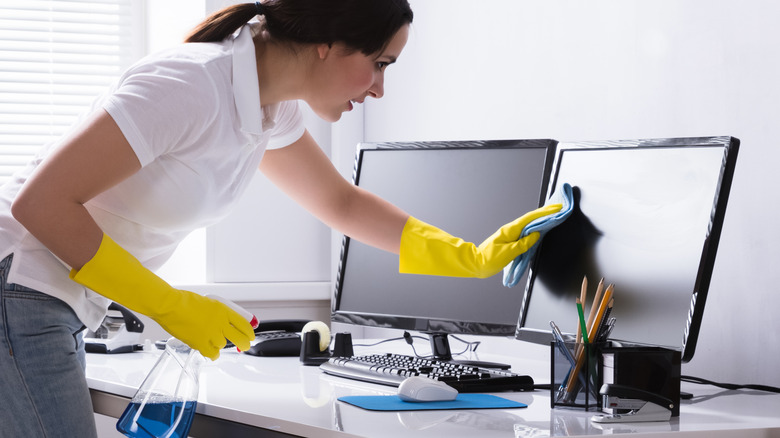Easy Habits That Will Help You Stay Healthy At Work
Your job might be necessary to keep a roof over your head, but if you're not careful, it also could become one of the worst things for your mental and physical health.
According to the Better Health Channel, stress is a prime cause of health problems, including anxiety, depression, and injuries arising from stress-involved work hazards. U.S. News & World Report adds that toxicity in the workplace, unfulfillment from your job duties, and not getting enough physical movement at work can also lower the quality of your health. One 2014 study published in the National Library of Medicine found that men and women who have high stress levels from their jobs are at greater risk of developing type 2 diabetes.
The takeaway: You should probably focus on your mental and physical health when you work, despite being busy with meetings and deadlines. Fortunately, there are simple measures you can take to support your health at work.
Pack your lunch
Not only can eating out for lunch every day drain your bank account quickly, but it also can put a damper on your health. When you pack a lunch, you're in complete control of what you put in it. That means that you can follow along with the U.S. Department of Agriculture's helpful meal-planning tool, MyPlate, which gives an easy breakdown of how much of each food group to eat at each meal. For packed lunches, aim for a majority of your container filled with healthy grains and vegetables, slightly smaller portions of protein and fruit, and an even smaller portion of dairy.
The Better Health Channel offers some insight for making your packed work meals as nutritious as possible. One tip? Reuse leftovers to prevent food waste and stay in control of your work lunch. For example, you might use leftover chicken as a salad topper or dip leftover veggies in Greek yogurt with a sprinkle of garlic powder and onion powder mixed in. Also, prepare your lunches when it's most convenient for you, like a few minutes before bedtime, so you're not rushing to get everything done in the morning.
Move as often as possible
Long periods of sitting are not good for the body. Unfortunately, with an office job, it can be challenging to find ways to move around when you're glued to a computer screen for most of the day. However, as doctor Edward R. Laskowski explains in response to a Mayo Clinic question, "Any extended sitting — such as at a desk, behind a wheel or in front of a screen — can be harmful. When you sit, you use less energy than you do when you stand or move. Research has linked sitting for long periods of time with a number of health concerns." Laskowski lists obesity and high cholesterol levels as two areas of concern that come with sitting too much.
To combat inactivity, find little ways to move as much as possible. Throughout the day, walking more, stretching, and even standing at your desk can add up to a couple more hours of movement than you were getting before. Prevention notes that doing some quick exercises or stretches while you answer the phone or wait for an elevator can boost activity. Also, climbing stairs or walking to work could be a good way to get some extra steps into your workday.
Bring water with you everywhere
When you're thirsty, you feel like you need to drink. But that simple feeling might turn into a nagging feeling the longer you go without water. What your body is really trying to tell you is that you're starting to become dehydrated and it's time to get some water in your system. Dehydration carries with it a lot of side effects, like muscle cramps, headaches, and food cravings (per iCare ER & Urgent Care). But as the hours pass by at work, it might be difficult to remember to stay hydrated.
The best way to remind yourself to drink water is to always have water in plain sight at work. Registered dietician Monica Auslander tells Thrillist, "Carrying water encourages you to drink more merely by the exposure effect." According to iCare ER & Urgent Care, tracking your intake can help you get into the habit of drinking water at work, too. Jot down each time you drink or use a phone app with drinking reminders. Registered dietician Abbey Sharp suggests wrapping a rubber band around your bottle each time you refill it to stay on track (via Thrillist).
Take quick meditation breaks
Work can be a hotspot for stress. While it's not uncommon to get frustrated and frazzled at work, learning how to handle your stress can make a real difference with your health.
Enter meditation, which has become an increasingly common practice in the workplace. In fact, offices across the country have added meditation spaces to increase employee wellness. Pearson is just one company that's transformed extra office space into relaxing rooms for peace, quiet, and meditation. Senior vice president of human resources Angela Schwers explains (via MarketWatch), "They have become part of the culture. The wellness rooms are used every hour of every day...We get such positive feedback, [and] it's been such a part of our culture [that] we'd hear noise if we weren't going to offer them anymore."
Even without a meditation area, you can still find ways to manage stress through meditation at work. Inc. suggests connecting to yourself with the help of a guided meditation app or practicing mindfulness during your lunch break.
Keep your eyes protected
It goes without saying that people working with hazardous materials for a living should wear safety goggles to protect their eyes. However, those working with computers day in and day out are also responsible for protecting their peepers.
Exposure to screens can not only cause eye irritation, but it can also put a strain on your eyes and potentially lead to damage over time, according to Esen Akpek, a professor of ophthalmology at Wilmer Eye Institute (via Johns Hopkins Medicine). "When your eyes become dry, that reduces reading speed, which further increases exposure time and worsens dryness, and this can ultimately lead to inflammation of the eye surface and a self-perpetuating chronic dry eye," explains Akpek.
What can you do? Positioning your computer properly is a good first step. Be sure to have at least an arm's length between you and your screen, and set up your monitor where it reduces glare the most (per Case Western Reserve University).
Get plenty of sleep on work nights
Sleep should always be a priority — yes, even on the weekends! According to sleep experts at Sleep.org, getting inconsistent sleep can disrupt your sleep-wake cycle, which your body relies on to regulate your metabolism and energy. The best way to keep everything on track is sticking to similar bedtimes and wake times each day.
When you do that, you may find it easier to get to bed on work nights and wake with your alarm in the morning. That's good news for you, because getting plenty of sleep is non-negotiable when you have a long day of work ahead. Harvard Business Review explains that, although common in the workforce, sleep deprivation can increase work-related injuries, decrease productivity, and affect memory and learning.
According to the Mayo Clinic, you can boost your sleep efficiency by getting enough physical activity during the day, limiting naps, and making your space as relaxing as possible before bed. Also, find ways to manage stress so that you're not taking all your anxiety with you to bed.
Pay attention to your posture
Having good posture is important for your health. According to Healthline, good posture can increase energy, improve core strength, reduce headaches, and prevent pain in your back, jaw, and neck. It's also a necessity for physically active people, as having the right posture can decrease the risk of injury during workouts.
Unfortunately, being on your feet at work or sitting at a desk most of the day can make your posture fall to the wayside. By the end of the day, we're tired and worn out, and posture becomes less of a concern to our fatigued bodies. If you're on your feet at work, pull your stomach in, keep your weight mostly on the balls of your feet, and make sure your head is level (per MedlinePlus). If seated most of the day, sit so that your feet are planted on the floor and keep your arms at a 90-degree angle and shoulders relaxed when typing. Keep your mouse close to the keyboard and move the keyboard directly in front of you (per Case Western Reserve University).
Keep healthy snacks on hand
Snacking at work can be a good way to keep your energy up to prevent the midday slumps you might get as the day trucks along. The Harvard T.H. Chan School of Public Health says that in addition to providing extra energy, snacks can also add necessary nutrients to your diet and keep your appetite leveled out to prevent overeating at meals. In other words, you might not feel as compelled to nosh out at lunchtime to curb those hangry noises in your belly.
Not all snacks are healthy, of course. To reap the benefits of snacking at work, make good-for-you snack choices. MedlinePlus suggests air-popped popcorn, raw carrots or peas, an apple, a small handful of nuts, or low-fat yogurt as thumbs-up options. However, paying attention to serving sizes is a must. Always read nutrition labels to make sure that you're eating just one serving, which should provide you with a much-needed energy boost without adding extra calories, fat, or sugar to your diet.
Find ways to stay social
Some people work in teams with others all day, while others have more of a solo job that doesn't require a lot of interaction with others. If you fall into the latter category, you might want to consider finding ways to socialize while staying productive at work.
Why? According to Mayo Clinic psychologist Dr. Craig Sawchuk, "We are social animals by nature, so we tend to function better when we're in a community and being around others." Sawchuk adds that socializing improves feelings of loneliness and depression, increases happiness, and can boost cognition.
Work socialization may also lead to a healthier life overall. Strong relationships are linked with important health benefits, like lower blood pressure, healthy weight, and increased lifespans (per the Mayo Clinic).
Whether your work interactions happen in person or virtually (such as through phone calls or video meetings) shouldn't matter, as any form of socialization can carry benefits. Forbes suggests that workplaces create social spots, plan social events or small celebrations, and encourage team-building exercises to keep employees communicating with one another. If your workplace lacks in its socialization efforts, perhaps make a few suggestions at your next meeting.
Wash hands properly
Practicing good self-hygiene habits is not only good for your health, but it's also highly beneficial for everyone who works with you.
Handwashing is one of the best ways to protect yourself and your coworkers from illnesses that spread through groups quickly. According to the CDC, handwashing can reduce respiratory illnesses within a community by 21% and decrease incidences of illnesses that cause diarrhea by 31%. Wash your hands before and after eating, using the restroom, and taking breaks, and after you cough, sneeze, or blow your nose to keep them as free of germs as possible.
Luce adds that if you work with food at your job, you should wash every time you handle food to keep bacteria from spreading from one area to another. To wash your hands properly, wet your hands and lather with antibacterial soap for 20 seconds, being sure to reach between your fingers and on the backs and palms of your hands. Then, rinse and dry completely, and follow with hand sanitizer.
Learn to handle stress in productive ways
Probably not surprisingly for most, data from the American Psychological Association's Stress in America report shows that work ranks high among working generations as a top source of stress. For Gen Xers, it ranks fifth, Boomers and Millennials rank it third, and Gen Zers place work second in their list of stressors, just behind health-related concerns.
Stress is a real problem at work that can affect your life outside of work, too. The American Psychological Association suggests writing down when things affect your stress at work and what you did to combat that stress, if anything. This practice makes you mindful of your stressors so that you can find patterns and learn to control them through healthier habits. Practicing deep breathing exercises or taking a quick walk might help you get back into a relaxed state.
When things get too challenging to handle on your own, you might consider chatting with your boss about your work stressors. Together, you could come up with ways to relieve some of the pressure on your shoulders. Seeking an outside counselor may also help you find ways to deal with stress productively (via Healthline).
Join an employee wellness program
An employee wellness program promotes, well, the wellness of employees! These programs can take on many forms and offer various features, including discounts on gym memberships, health education, fitness classes and competitions, and rewards for completing wellness tasks. According to Concentra, healthy employees are more productive, are absent from work less, and have lower risk of injury than other employees.
If your employer has a wellness program, join it! They're usually free and can offer several perks for you and your wellness. As an example, consider ESL Federal Credit Union's wellness program, which offers workshops, wellness screenings, and a fitness center for employees, as reported by A Healthier Upstate. ESL's wellness coordinator Deena Rodriguez says, "A number of employees have thanked us for these screenings because we were able to detect critical health issues, including pre-diabetes and high cholesterol. If those issues went unchecked, who knows what could have happened."
Schedule a vacation
In case you needed a reason to take a vacation from work, here's a big one: Taking more than 11 days of vacation could lead to a 30% raise (per Harvard Business Review). That's because a well-planned vacation makes you feel refreshed, allowing you to get back to work as your most productive and creative self.
But there are plenty of other health-focused reasons to take a break, too. According to Allina Health, vacations clear your mind and improve your mental health, effectively lowering stress and anxiety that builds up from work. It can also raise your overall happiness and reduce feelings of burnout.
However, we know that taking a vacation is often easier said than done. Still, it's a necessity for your well-being. Harvard Business Review suggests planning your vacation at least a month ahead of time is crucial to make sure your vaca is all about relaxing, not planning. Also, spend plenty of time in nature and without technology to reconnect with yourself.
Do your part to keep the office clean and sanitary
Keeping an office or workspace clean falls on everyone's shoulders, so be sure to do your part to de-germ and sanitize your space. Bacteria can hang out in lots of places at work, with so many people going in and out all day. Some key areas to focus on: Phones, desks, computers and their accessories, mugs, the water cooler, restrooms, and vending machines. These high-touch areas can harbor germs all day long, so the more frequently they get cleaned, the better (per WebMD).
Another important way to stop germ spread at work is to stay home if you're sick. This can be tough for self-proclaimed workaholics, but it's necessary for you and your coworkers. You'll probably be less productive anyway, and you'll keep others from catching your germs. Stay home if you've been vomiting, have diarrhea, or have had a fever within the last 24 hours (per the Western Upper Peninsula Health Department).















